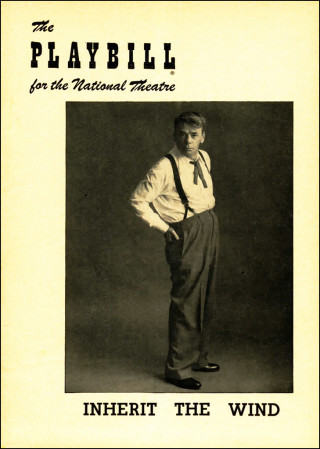Crucial to its success was that Lawrence and Lee set Inherit the Wind in “a small town” not in 1925, but in, as the stage directions instructed, “Summer. Not too long ago.” Audiences were supposed to think not about 1925, but about their own lives and beliefs. The playwrights intended the drama as an allegorical parable for the age shaped by Wisconsin Senator Joe McCarthy.
Accordingly, the moral lesson was not about evolution and creationism; it was about blacklists and anti-Soviet hysteria. The playwrights essentially used the moral panic over evolution at the heart of the play to stand in for the contemporary moral panic over communism. In the preface to the first published edition of the drama, they clarified the stage directions. “It is not 1925. It might have been yesterday. It could be tomorrow.” Decades later, Lawrence explained during the 1996 Broadway revival: "We used the teaching of evolution as a parable, a metaphor for any kind of mind control. It's not about science versus religion. It's about the right to think." The metaphor resonated with audiences. But it also reshaped popular memory of Scopes in the years and decades to come.
After the triumphal premiere in Dallas, the production moved to Broadway and ran for two years, closing in 1957. It would be revived there twice more, first in 1996 and then in 2007. Recent years have seen multiple national revivals of the play in professional, university, and community theaters. Nationally acclaimed theaters like The Goodman in Chicago and California’s Pasadena Playhouse put it on during their 2023-24 seasons.
Hollywood didn’t ignore the play’s success either. In 1960, Inherit the Wind became a multiple Oscar-nominated film, featuring stars Spencer Tracy, Frederic March, and Gene Kelly. Three made-for-TV movies followed in 1965, 1968, and 1999 with impressive casts of their own.
Margo Jones could not have had any idea when she pulled the play out of her slush pile of unproduced works that she was breathing life into an enduring inspiration for those who fight for knowledge over dogma, reason over fanaticism, and freedom over censorship. What she did know, however, was that live performance reveals the truths inherent in a story and focuses the audience on the meanings and feelings inspired by that truth.
Whether it is the Red Scare of the 1950s or current attempts to censor curricula and ban books storytelling through the theater connects audiences to a long history of those who prize the truth. Theater has the potential to remind audiences that the past is never truly past, and that making knowledge illegal doesn’t erase it or make it less true.
